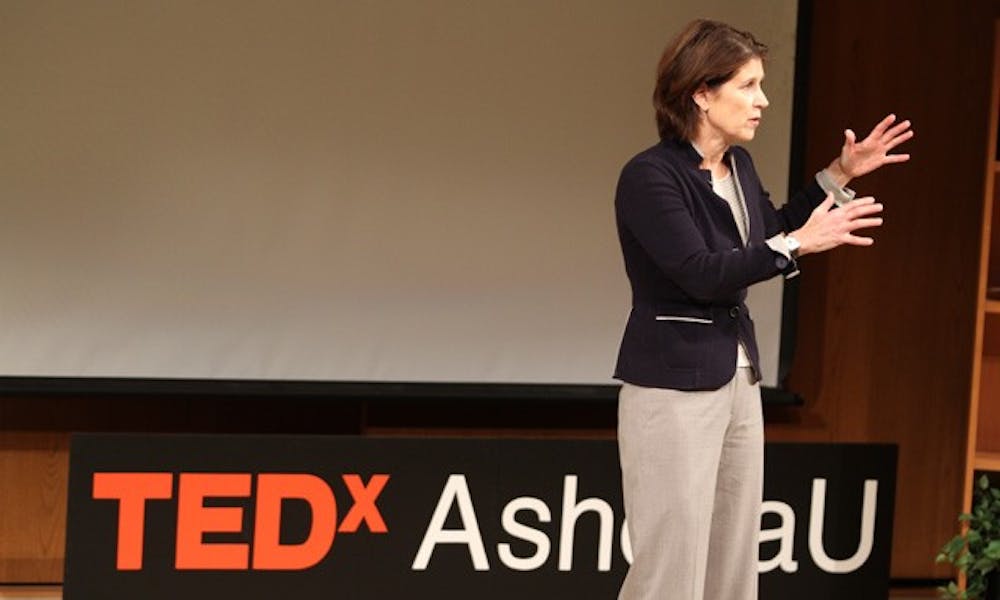When it comes to universities’ future role in global change, academic institutions have two options: They can either be in the way, or in the lead, said Phillip Auerwald, associate professor at the School of Public Policy at George Mason University.
Twenty distinguished speakers enlightened the Duke community on how to take on a positive role in the future of social entrepreneurship Friday at the TEDxAshokaU talks, titled “Universities Driving Global Change.”
“Change is going to come to universities,” Auerwald, the master of ceremonies for the event, said in an interview. “The question is how universities will respond to that change. ‘In the way’ would consist of them just trying to keep doing what they have been doing for as long as possible. ‘In the lead’ is saying we have great assets and we bring a lot to society and figuring out what universities can do that other people can’t do more effectively. That is a great opportunity.”
TED, which stands for “Technology, Entertainment and Design,” is a non-profit organization committed to spreading ideas and generating discussion. Known for its annual conference featuring presentations by the world’s greatest minds. TED also sponsors self-organized and local events that share its unique mission, referred to as TEDx events.
This weekend’s TEDx program—sponsored by the Center for the Advancement of Social Entrepreneurship at the Fuqua School of Business—was planned by Ashoka U, an organization of universities that work with Ashoka, the world’s largest association of social entrepreneurs. It was the kick-off event for AshokaU’s weekend-long conference, which also included small workshops for participating students, educators and social entrepreneurs.
“What is great about TED talks is that they present big picture ideas,” said Parag Gupta, speaker at the event and founder of the green initiative Waste Ventures. “I use them to think about how I can cross over ideas. It may be a talk about marine biology, but it still may spark an idea that I can apply to my field.”
Craig Wing, executive director of CleanTech U, an organization of entrepreneurs dedicated to reducing environmental impact, encouraged the audience to find their own views and pursue their own interests. Wing said changing the world is all about catalyzing action. If that action is controversial, even better, he said.
“Once you find out what you want to do, I would say then you should ask yourself how you can start trouble,” Wing said. “Because it really is the stirrers and the troublemakers that are the ones that make the most change. Have the guts to really stick your neck out. You are going to get hit a couple times, but in the end you are the one that is going to make the most change.”
The talk also featured two student speakers. Regina Duran, a junior at Arizona State University, discussed the power universities have to show students how they are going to change the world. A double major in Nonprofit Leadership and Management and Business Global Politics, Duran said she knows she is going to change the world—she just does not know how yet. She believes, though, that she will create her own path in the process.
“[TED talks] are about inspiring people to continue to create change,” Duran said. “Many of us in the room have that passion inside of us and many of are still searching for that path that we are going to take to create that change.”
The current generation of students must focus on taking the path less traveled if global change is going to be a reality, Auerwald said.
“As a student, it goes so far beyond being an informed consumer,” he said. “You have to build your own path. It is irresponsible to yourself and to your own future to count on credentialing and external factors to be the way to build your future. You have to go for what is meaningful to you to build your own life.”
Many speakers also discussed the role of technology in shaping how young people can promote global change. To highlight this point, Wing referred to current events in Egypt.
“Young people have the potential and ability to make change,” he said. “The times have changed because of technology and now you have the freedom to do things. Just look what Facebook did for the revolutions in Egypt.... [University students] are in the best place that they can be for stimulation and to open their eyes.”
Romina Laouri, executive producer for the event, said she was pleased with its success. With a sold-out crowd of 400 and 260 listeners online, the turnout for TEDxAshokaU was larger than Laouri expected. Generating ample discussion on Twitter and Facebook, the event also motivated the audience to take advantage of the variety of speakers that shared their unique perspectives, she added.
“What really surprised me was the turnout and how late people were willing to stay to talk,” she said. “People were really mingling late after the reception and talking to speakers. Seeing those kinds of interactions was no doubt one of my favorite moments.... Our audience definitely really enjoyed it and loved the TED format.”
Get The Chronicle straight to your inbox
Signup for our weekly newsletter. Cancel at any time.

